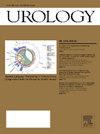基因检测在肾结石评估中的应用:来自一家多学科肾结石诊所的回顾性研究。
IF 2.1
3区 医学
Q2 UROLOGY & NEPHROLOGY
引用次数: 0
摘要
目的:描述在我们的多学科肾结石诊所接受基因检测的患者的遗传和临床特征:描述在我们的多学科肾结石诊所接受基因检测的患者的遗传和临床特征:对 2018 年至 2022 年期间在我院结石门诊接受评估并转诊至遗传学的患者进行回顾性分析。研究纳入了患者的人口统计学、临床、结石和遗传学数据。我们评估了队列中发现的特定变异,包括与致病相关的变异和意义不明的变异(VUS):2018-2022年,在我们结石门诊就诊的825名患者中,有50名患者被转诊至遗传学。在这些患者中,33/50(66%)接受了基因检测并纳入分析。在接受基因检测的患者中,19/33(58%)名患者被鉴定出变异体,其中9/33(27%)名患者为已知致病变异体。在确定了致病变异体的患者中,大多数人有结石家族史(55.6%)、钙基结石(77.8%)、18 岁前首次结石(66.7%)、反复结石(100%),并且在检测前已接受药物治疗(88.9%)或手术治疗(88.9%)。在对有致病变异、VUS和无变异的患者进行比较时,人口统计学和临床参数没有显著差异:结论:在我们的结石病诊疗中,一半以上接受基因检测的患者被发现存在变异。结论:在我们的结石诊疗过程中,半数以上接受基因检测的患者被发现存在变异,但其中大多数变异的意义不明。我们需要进一步评估基因检测对肾结石治疗的影响。本文章由计算机程序翻译,如有差异,请以英文原文为准。
The Use of Genetic Testing in Nephrolithiasis Evaluation: A Retrospective Review From a Multidisciplinary Kidney Stone Clinic
Objective
To describe genetic and clinical characteristics for patients undergoing genetic testing at our multidisciplinary kidney stone clinic.
Methods
A retrospective review was performed on patients evaluated in our stone clinic and referred to genetics between 2018 and 2022. Patient demographic, clinical, stone, and genetic data were included. We assessed the specific variants identified in our cohort, both those with a pathogenic association and variants of unknown significance.
Results
Of 825 patients seen in our stone clinic from 2018-2022, 50 patients were referred to genetics. Among these patients, 33/50 (66%) underwent genetic testing and were included in the analysis. Of those who underwent genetic testing, a variant was identified in 19/33 (58%) patients, and 9/33 (27%) of these were a known pathogenic variant. Among patients with a pathogenic variant identified, the majority had a family history of stones (55.6%), calcium-based stones (77.8%), had their first stone prior to age 18 (66.7%), were recurrent stone formers (100%), and had been managed medically (88.9%) or surgically (88.9%) prior to testing. When comparing patients with a pathogenic variant, variants of unknown significance, and no variant, there were no significant differences in demographic or clinical parameters.
Conclusion
In our stone practice, more than half of patients who underwent genetic testing were found to have a variant. However, the majority of these variants were of unknown significance. Further evaluation regarding how genetic testing can impact nephrolithiasis management is needed.
求助全文
通过发布文献求助,成功后即可免费获取论文全文。
去求助
来源期刊

Urology
医学-泌尿学与肾脏学
CiteScore
3.30
自引率
9.50%
发文量
716
审稿时长
59 days
期刊介绍:
Urology is a monthly, peer–reviewed journal primarily for urologists, residents, interns, nephrologists, and other specialists interested in urology
The mission of Urology®, the "Gold Journal," is to provide practical, timely, and relevant clinical and basic science information to physicians and researchers practicing the art of urology worldwide. Urology® publishes original articles relating to adult and pediatric clinical urology as well as to clinical and basic science research. Topics in Urology® include pediatrics, surgical oncology, radiology, pathology, erectile dysfunction, infertility, incontinence, transplantation, endourology, andrology, female urology, reconstructive surgery, and medical oncology, as well as relevant basic science issues. Special features include rapid communication of important timely issues, surgeon''s workshops, interesting case reports, surgical techniques, clinical and basic science review articles, guest editorials, letters to the editor, book reviews, and historical articles in urology.
 求助内容:
求助内容: 应助结果提醒方式:
应助结果提醒方式:


